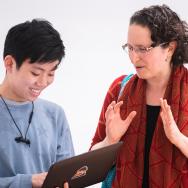With summer in full swing it’s the perfect time to dive into some new books and music. Whether you’re laying out on a grassy lawn or watching a July storm roll by through your window, this year’s Quantrell and Graduate Teaching award winners have some recommendations on great media to enjoy:
Albert Bendelac, A.N. Pritzker Distinguished Service Professor, Department of Pathology and the College
“There are a few general science books that are very inspiring. I think of The Selfish Gene by Richard Dawkins. I think that should be mandatory for anybody coming to any field in immunology. It gives you a very strong sense of understanding evolution in variety of fields.”
“There’s also The Eighth Day of Creation. It is the story of early molecular biology and early structural biology. It’s wonderful to read about the 1950s, 1960s and the very beginning of modern biology. I think those are the two books that are very nice reads and also very inspiring.”
Claudia Brittenham, Associate Professor of Art History and the College
“The Calculating Stars by Mary Robinette Kowal is a science fiction novel about an alternate world in which a meteor hits the earth in the 1950s and the space program gets accelerated. It’s really thoughtful about issues of gender and race and science and anxiety and Judaism. It’s a fantastic book that packs so much into an absolutely riveting story.”
“The Pillow Book of Sei Shōnagon is a diary of a 10th-century Japanese woman at court. It’s why I learned Japanese. It’s a magical book for me because she makes lists, like things that give you a cool feeling on a hot summer day—and there are these little anecdotes and some court gossip and some poetry. This woman’s personality comes through so strongly, in spite of the translation, in spite of all of these centuries.”
Berthold Hoeckner, Professor of Music and the Humanities in the College
“For reading, Austerlitz by W. G. Sebald. It’s an amazing story—or any of the four stories in The Emigrants. Deep, rich, serious and heavy reading.”
“I feel strongly that sometime in your life, immerse yourself in the music of Bach, and a good piece to listen to is the Goldberg Variations. A work that I listened to just recently is the Second Symphony by Rachmaninov. It’s a piece that has so many beautiful melodies and bittersweet, soaring, stringing lines that you can think about this as feasting on buckets of ice cream, with cream, for an hour, without worrying about your cholesterol. A piece that has a similar effect and is more of a master work in a classical sense is Elgar’s Cello Concerto.”
Maryanthe Malliaris, Associate Professor of Mathematics and the College
“I’d recommend Barry Mazur’s Imagining Numbers. In research one almost never knows how deep a question is, how long it will take to answer, and what gradual shifts in thought are required before the solution becomes clear. This is a wonderfully written, thought-provoking book which also is able to get across something of that long movement of thought, both its pace and its creativity (which, by the time we finally arrive at a solution, has allowed us to start to map an entire landscape and to see the new questions on the horizon).”
Mauricio Tenorio-Trillo, Samuel N. Harper Professor of History, Romance Languages and Literatures, and the College
“I ask my students—and everybody—to read Jorge Luis Borges’ short stories. That teaches them how to think and how to write succinctly. It works marvels. People really like it, in part because Borges translates really well to English. He could have been a writer in English.”
Tenorio-Trillo also recommends The Autumn of the Middle Ages by Johan Huizinga: “It’s a lesson on how to tell stories—significant, important, historical lessons. I tell my students to read it not only for what you can learn about the Middle Ages, but to learn how to tell stories.”
Rochona Majumdar, Associate Professor in the Department of Cinema and Media Studies, South Asian Languages and Civilizations
“A book that I first encountered as an undergraduate in Kolkata, India and that I periodically return to is Jawaharlal Nehru’s An Autobiography (1936). Written by of one of the leading statesmen of the 20th century, Jawaharlal Nehru’s autobiography is an absorbing reflection of the Indo-British encounter and of India’s freedom struggle. Much of it written in prison, Nehru’s words are an eloquent testament to the contradictory longings for family and a free nation before the end of empire. It documents how a modern, highly educated and forward-looking leader struggled to connect with a diverse and largely non-literate peasant population.”
Jennifer Pitts, Professor of Political Science and the Committee on Social Thought
“Adom Getachew’s Worldmaking after Empire is beautifully written, and a brilliant example of new directions in global history of political thought. It deals with black intellectuals and political leaders in the U.S., and the Caribbean and Africa, who were thinking creatively about both about politics and economics in the world after decolonization—and who understood there had to be radical transformations of the whole global structure for decolonization to succeed. I think it’ll really shake up the field.”
Larry Zbikowski, Professor of Music and the Humanities in the College
“I tend to read across a variety of disciplines, enjoying the way disparate traditions of thought can inform one another. One of my regular recommendations to students and others is Paul Connerton’s How Societies Remember, which has the twin virtues of being highly readable and only about 100 pages long. Andy Clark’s Surfing Uncertainty is an incredible romp through recent work on predictive processing, providing insight into a novel way to think about thought processes. And, if you are daring enough to mix media, Scott Burnham’s Mozart’s Grace, paired with some in-depth listening, is as endlessly rewarding as Mozart’s music.”
